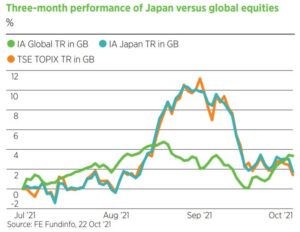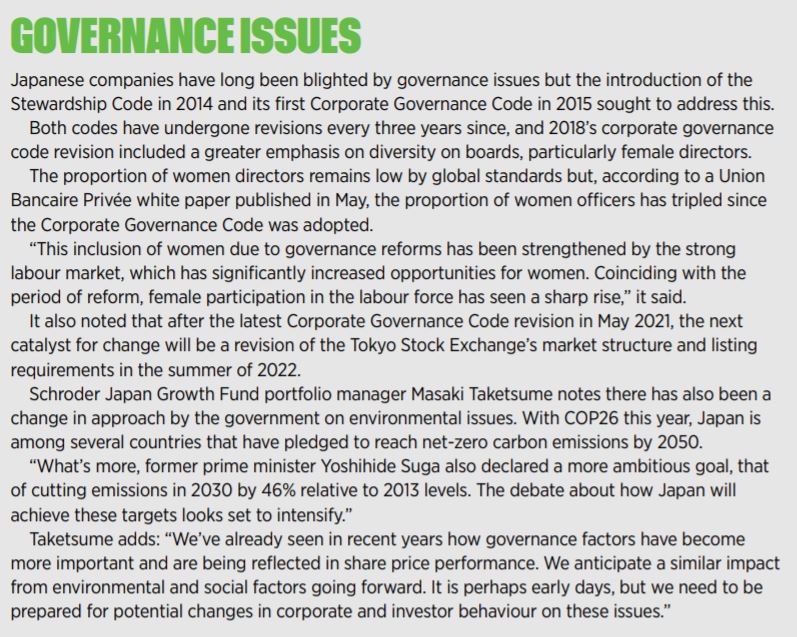Japan’s new prime minister Fumio Kishida has vowed to steer the country away from ‘Abenomics’, the policy at the heart of the world’s third-largest economy for the past decade. But fund managers and fund buyers aren’t convinced he’ll have the freedom to deviate far from the status quo.
Abenomics was coined in 2012 to describe then prime minister Shinzo Abe’s approach to tackling the country’s two prior decades of economic stagnation after the recession of 1991. Abe’s three so-called ‘arrows’ of aggressive monetary policy, flexible fiscal policy and growth strategy were aimed at hauling the country out of its state of minimal growth and overall deflation.
The programme has been effective in supporting Japan’s largest firms, and in 2017, five years in, the IMF declared the policy a triumph, saying Abenomics had “proven successful in easing financial conditions, increasing corporate profits, and boosting employment and female labour force participation”.
But speaking to the Financial Times recently, Kishida, who became the country’s premier at the end of September after replacing Yoshihide Suga as the Liberal Democratic Party (LDP) leader, which went on to win the general election in October, spoke of wanting to achieve “a virtuous economic cycle” by closing the gap between rich and poor by parting from Abenomics.
Kishida told the FT that Abenomics had delivered in terms of gross domestic product, corporate earnings and employment, but “failed to reach the point of creating a ‘virtuous cycle’ by raising the incomes of, not just a certain segment, but a broader range of people to trigger consumption”.
This ‘new capitalism’ is a bold sentiment for a prime minister looking to make his mark early on, but fund managers and fund buyers think Kishida will have little choice but to maintain the norm rather than implementing radical change.
A more serene backdrop
Schroder Japan Growth Fund portfolio manager Masaki Taketsume observes that Kishida inherits a brighter situation than his predecessor Suga, whose brief one-year tenure was marred by the twin challenges of the Covid pandemic and hosting of the Olympic Games while the country was in a state of emergency, both against a backdrop of slow vaccine rollout.
Taketsume notes the vaccination campaign has ramped up in recent months and Japan has now fully vaccinated a larger share of its population than the US.
“The pick-up in the pace of vaccinations means Japan was able to lift its state of emergency – which covered most of the population – at the end of September,” he says. “As Japan has benefited from the broader global economic recovery this year, we should now start to see the domestic economy reopen and recover.”
But in terms of government policy under Kishida, Taketsume anticipates a continuation, given a new supplementary budget and further stimulus are already under discussion. He thinks the stimulus package will focus on additional support for those who suffered financially during the pandemic.
Media reports had suggested Kishida would raise capital gains tax, which he played down, and he is also understood to want to introduce tax incentives for companies to raise wages and pay increases for nurses and care workers as part of plans to strengthen the country’s medical system to cope with Covid-19.
Kishida leadership an uninspiring prospect
T Rowe Price Japanese Equity Fund portfolio manager Archibald Ciganer finds the prospect of Kishida as leader uninspiring, as he too thinks it unlikely anything will change from a political perspective.
“We are not excited by a Kishida premiership and believe this was something of a missed opportunity to accelerate change,” he says. “The power structure within the LDP is unchanged and is supportive of the Abenomics programme, which remains on track, but the pace of reform will likely be steady rather than spectacular from here.”
Ciganer also believes some of the noises in the media regarding Kishida’s plans for reform are overplayed, and primarily a case of election engineering. “We saw an example of this recently when it was reported Kishida was planning to raise capital gains tax, only for him to subsequently come out and confirm that no such changes are being considered.”
Whitechurch Securities investment manager Simon Jaffe says while Kishida is trying to stimulate a positive narrative about breaking with the past and boosting economic growth, he is not sure he will end up deviating far from the path. This is because the monetary and fiscal policy have been so stimulative for so long and cannot be unwound easily.
“The Bank of Japan’s asset purchase programme over the past decade has left the Bank of Japan with a balance sheet equivalent to 135% of GDP, including ownership of 7% of the Japanese equity market,” he says. “While it is true that the position was moving towards balance before the pandemic, this reversed in 2020 with the fiscal deficit reaching 12.6% of GDP. Given these constraints, we would be cautious about expecting radical policy changes.”
Too many false dawns
Iboss investment director Chris Metcalfe comments that after 37 years in the industry, he has grown tired of trying to call what is going to happen in Japan. “I have always found managers and experts who make a bullish case for investing, but then nothing happens,” he says.
He notes that one reason to exclude Japan was its unconventional monetary policy, but similar moves recently by other central banks, including the Federal Reserve and European Central Bank, has “levelled the playing field”. This led Iboss to increase exposure in May 2020 and incorporate a specific Japan-only equity holding.
Some Japan funds have struggled more than others in recent years and, according to BMO Gam’s Q2 2021 FundWatch Survey, the IA Japan sector has failed to deliver one fund that has achieved top-quartile performance over three years. JO Hambro Capital Management recently closed its Japan fund after a period of underperformance.

But earlier this year, in Q1, interest in Japanese equities among UK fund buyers started to swell as they searched for value plays to ride the Covid recovery wave, according to Bonhill Intelligence. Fast forward to September and Japan-focused funds ranked high in the monthly performance tables, with three funds in the top 10. The Janus Henderson Japan Opportunities, Lazard Japanese Strategic Equity and Man GLG Japan Core Alpha funds all featured in the tables, with total returns of 7.28%, 6.48% and 6.22%, respectively.
The Japan and Japanese Smaller Companies sectors were the top performers, with average returns of 4.62% and 3.49%.
Beyond the headlines
Whitechurch Securities is slightly underweight Japan. Jaffe says while the country has implemented some investor-friendly corporate governance reforms (see box out below) and headline valuations look reasonable, the long-term economic outlook remains weak.
“In the short term, Japanese equities may continue the bounce as coronavirus vaccination rates improve, and the optimism engendered by the new prime minister boosts sentiment,” he says. “In the longer term, these issues are likely to fade and we continue to be more positive on other equity markets such as the UK.”

Whitechurch accesses Japan primarily through single-strategy funds on the belief that a dedicated fund manager is better placed to find the gems amid the intricacies of the market, including corporate governance and ownership structures.
Japan is currently the LGIM Multi-Asset Target Return team’s preferred regional overweight, according to manager Christopher Teschmacher. “It’s been beaten up of over the years,” he explains. “Except for a bit of a resurgence with the prime minister changing.”
Iboss has typically used managers with the ability to flex their position between Japan and Asia. One fund the DFM has used is Baillie Gifford Developed Asia, which has about 60% of its portfolio in Japan.
“For us, it is about knowing our limitations, and we just had to accept we could not call Japan,” says Metcalfe.
He says despite Bank of Japan’s levelling up of the monetary policy approach, the broader Japanese equity market has already given up its burst of relative outperformance, which was initially driven by the impending change of prime minister.
“Maybe this time is not different after all? But we continue to believe there is now a case for us having a specific allocation to Japan. It gives additional diversification – and its market is often moved by idiosyncratic domestic issues.
“In the often highly correlated world of global equities, this diversification is of real value to us as multi-asset managers.”
This article is taken from the November 2021 issue of Portfolio Adviser. Read more here.










